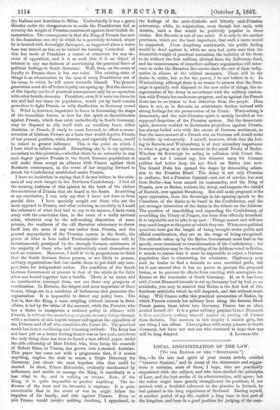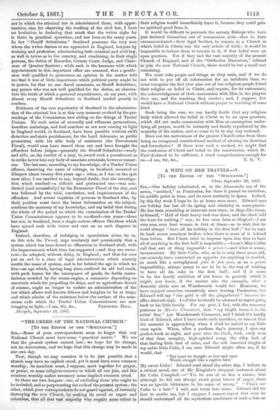LOCAL ADMINISTRATION OF THE LAW. [To THE EDITOR OF THE
"SPECTATOR."] the aim and spirit of your recent article, entitled "Quarter Sessions," and in many of the statements and sugges- tions it contains, most of those, I hope, who are practically acquainted with the subject, and who have studied the principles of Law, and the best modes of. its administration, will agree ; but the writer might have greatly strengthened his positions, if, not content with a doubtful reference to the practice in Ireland, he had pointed to the long experience of Scotland. Having myself, at another period of my life, resided a long time in that part of the kingdom, and been in a good position for judging of the man-
_ nor in which the criminal law is administered there, with oppor- tunities, also, for observing the working of the civil law, I have no hesitation in declaring that much that the writer sighs far is there in practical operation, and has been so for many years. In her "Sheriff Substitutes" Scotland possesses the very men whom the writer desires to see appointed in England, lawyers by training and profession, administering both criminal and civil law, as well in towns as in the country, and combining, in their single persons, the duties of 13.ecorder, County Court Judge, and Chair- man of Quarter Sessions ; while such is the keenness with which appointments to this important office are scanned, that a gentle- man well qualified to pronounce an opinion in the matter told me that it was of little importance which political party might be in power, for that no one dared nominate, as Sheriff Substitute, any person who was not well qualified for the duties, an observa- tion the truth of which a personal acquaintance, on my part, with almost every Sheriff Substitute in Scotland tended greatly to confirm.
Evidence of the vast superiority of Scotland in the administra- tion of the criminal law is at this very moment evolved by the pro- cee4ings of the Commission now sitting on the doings of Trades' Unions. No such series of cowardly and yillanous persecutions, heartless inabnimgs, and foul murders as are now coming to light iu England would, in Scotland, have been possible without swift detection and stern punishment, for the Lord Advocate, as public prosecutor, with his able body of assistants (the Procurators Fiscal), would soon have traced them out and have brought the offenders before judges—generally the Sheriff Sabstitute—ready and able, on the verdict of a jury, to award such a punishment as to strike terror into any body of associate criminals, however numer- ous. The last case, according to my knowledge,. of a Trades' Union offence, deserving the name of outrage, in Scotland, occurred at Glasgow about twenty-five years ago ; whop, as I was on the spot soon after, I am enabled to say, beyond doubt, that the investiga- tion which resulted—a difficult and protracted one—was eon- dacted (mind successfully) by the Procurator Fiscal of the city, and was followed by the trial, conviction, and imprisonment of the offenders. And recent inquiries of persons in Scotland who, by their position must have the latest information on the subject, confirms the accuracy of my knowledge, and my belief that during the whole of the period to which the examination of the Trades' Union Commissioners appears to be confined—ten years—there has not, in Scotland, been a single serious offence like those which have spread such wide terror and cast on us such disgrace in England.
Instead, therefore, of indulging in speculation alone, let us, on this side the Tweed, urge resolutely and persistently that a system which has been found so efficacious in Scotland shall, with the improvements which time has suggested—and they are nume- rous—be adopted, without delay, in England ; and thus for ever put an end to a state of legal administration which scarcely merit e the name of system, and is far behind the age in which we live—an age which, having long since outlived its old bad roads, with pack horses for the conveyance of goods, its feeble manu- factures unaided by the steam-engine, a commerce depending on uncertain winds for propelling its ships, and an agriculture devoid of science, ought no longer to endure an administration of the law which allows well known thieves and burglars to be at large, and which admits of the existence below the surface of the mon- strous evils which the Trades' Union Commissioners are now
dragging to light. am, Sir, &c., FREDERIC HILL. Abergele, September 18, 1867.































 Previous page
Previous page